Study the symbolic significance of night scenes in the Bible, uncovering deep spiritual insights and divine interventions in these pivotal moments.
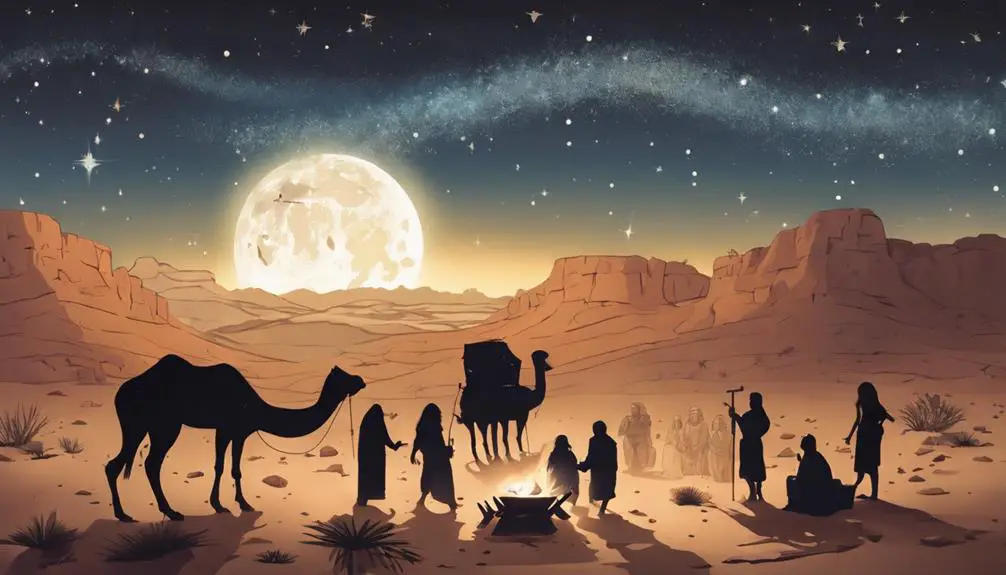
Night Scenes in the Bible
Did you know that there are over fifty night scenes depicted in the Bible?
These night scenes often serve as crucial turning points in the biblical narratives, revealing deeper spiritual insights and carrying heavy symbolic weight.
From Jacob's dream at Bethel to Jesus's prayer in Gethsemane, these nocturnal moments illuminate profound truths about faith, struggle, and divine intervention.
Now, wouldn't you like to explore these night scenes and uncover the profound messages they hold for our lives today?
Key Takeaways
- Night scenes in the Bible often mark significant turning points, symbolizing transformation and divine intervention.
- Rituals performed during night scenes, such as Passover Night, carry heavy symbolic weight and signify faith and obedience.
- Night scenes depict spiritual struggles and resolutions, emphasizing human vulnerability and divine resolve.
- Night scenes serve as metaphors for spiritual awakening and revelation, symbolizing the journey from darkness to light in faith and salvation.
Jacob's Dream at Bethel
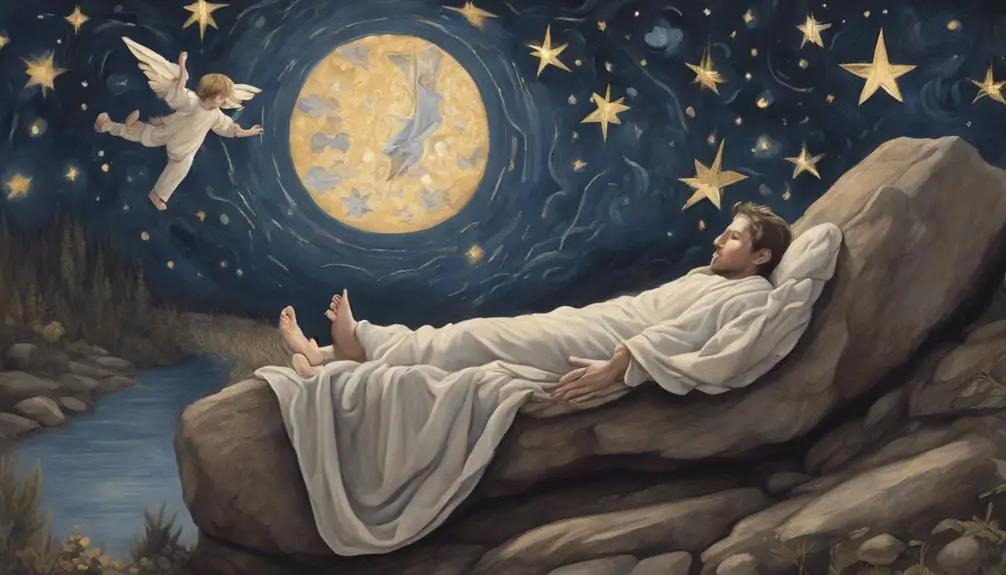
In one of the most profound night scenes in the Bible, you'll find Jacob at Bethel, experiencing a dream that not only shapes his personal faith but also resonates deeply within the broader context of biblical history. Here, dream interpretation isn't merely a psychological tool, but a divine means of communication. The vivid imagery of a ladder reaching to heaven, with angels ascending and descending, symbolizes the connection between the divine and the earthly realms. It's a scene that stirs up awe and wonder, illustrating the mystique of divine encounters.
Analyzing this event, you'll notice the profound impact it has on Jacob. He doesn't just wake up and shrug it off. Instead, he's deeply moved, recognizing the place as 'Bethel' or 'House of God.' This divine encounter reshapes his perception and steers his life in a new direction.
Jacob's dream at Bethel isn't an isolated incident but a part of a broader narrative. It signifies a divine affirmation of the covenant God made with Abraham, linking Jacob's personal experience to the grand tapestry of biblical history. Thus, this dream isn't just Jacob's—it's an integral part of a collective faith journey.
Passover Night in Egypt
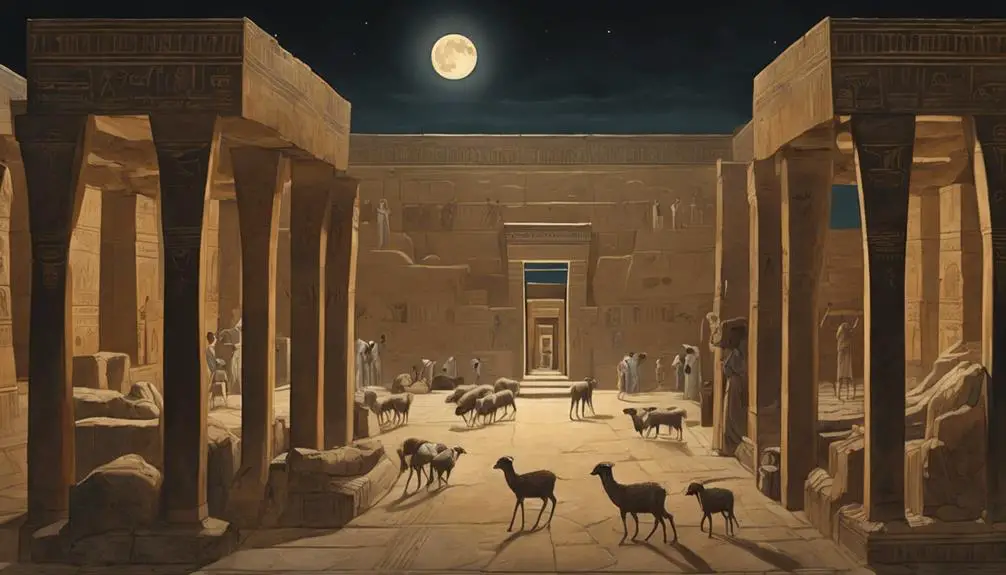
Shifting our attention to another pivotal nocturnal event, you'll encounter the Passover Night in Egypt, a momentous occasion that forever changed the course of the Israelites' history. This was the final of the ten Egyptian Plagues, where God smote the first-born of Egypt but spared the houses of the Israelites.
Marked by the Passover Rituals, this night was a testament to faith and obedience. Three crucial aspects of the Passover Rituals include:
- The selection and preparation of an unblemished lamb
- The smearing of its blood on the doorposts and lintel
- The consumption of the lamb with unleavened bread and bitter herbs
These rituals were performed in haste, with the Israelites dressed for travel, highlighting their readiness for imminent deliverance. The blood signified their protection and the lamb represented Jesus Christ, the sacrificial lamb in Christian theology.
The Passover Night, thus, isn't merely a historical event. It's a deep spiritual allegory, a prophetic foreshadowing of the coming Messiah. As you delve into this night scene, you'll appreciate the profound interconnectedness of events in the Bible, demonstrating the intricacy of God's divine plan.
Paul's Vision on the Road to Damascus
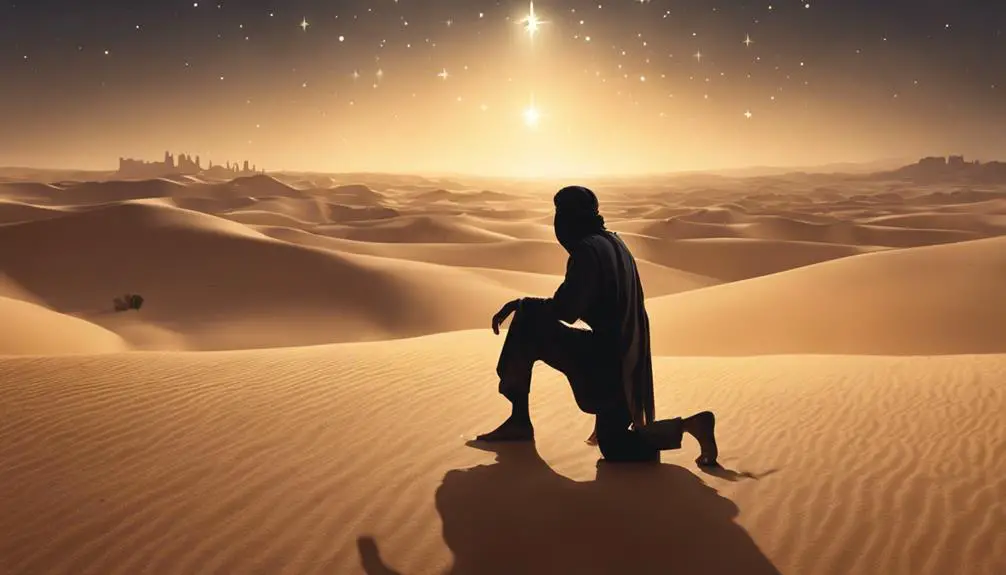
Moving forward to another significant night scene, you'll find Paul's vision on the Road to Damascus, an event that radically transformed not only his life but also the trajectory of Christianity. This dramatic encounter, often referred to as Paul's Conversion, has been a focal point in biblical studies, specifically within Vision Interpretation.
Before the vision, Paul, then known as Saul, persecuted Christians. On his journey to Damascus, he was struck blind by a bright light and heard a voice questioning his actions. This divine intervention led to his conversion.
Let's break down the event:
Aspect |
Description |
Significance |
|---|---|---|
Encounter |
Bright light and a voice |
Divine revelation |
Reaction |
Blinded, fell to the ground |
Humbled, helpless |
Message |
Questioned his actions |
Called to change |
Outcome |
Conversion to Christianity |
Spiritual rebirth |
This vision's interpretation is multifaceted: a personal call to conversion, a divine intervention, and a transformative event for Christianity. Paul's vision on the Road to Damascus holds great significance in understanding how night scenes in the Bible serve as pivotal points in the narrative and development of Christianity.
Jesus Prays in Gethsemane
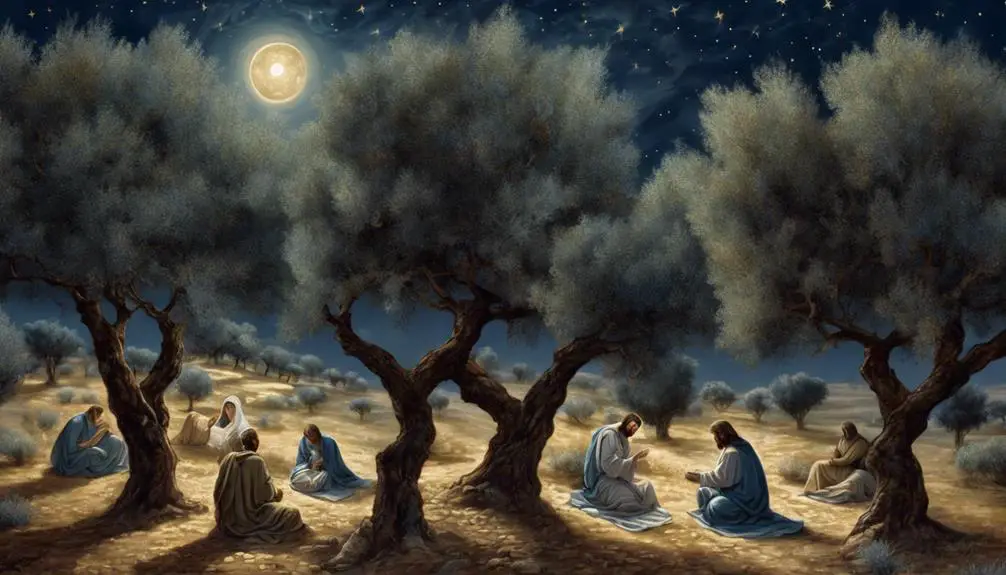
Another pivotal night scene unfolds with Jesus praying in Gethsemane, an event that underscores the human struggle and divine purpose inherent in his mission. You see a profound display of both human vulnerability and divine resolve. This scene is significant in highlighting Gethsemane's importance, as well as the power of prayer.
- Gethsemane, a garden at the foot of the Mount of Olives, served as a place of solitude and reflection for Jesus. It became a setting for one of his most intimate and critical moments.
- The prayer itself was powerful, reflecting the deep emotional struggle Jesus experienced. He prays fervently, even asking if the cup of suffering could be taken from him, demonstrating the intense human fear and divine obedience coexisting within him.
- Lastly, the response to Jesus' prayer underscores the divine purpose of his mission. Despite his pleas, the response was silence, a powerful reminder of the path he was destined to walk.
The event at Gethsemane encapsulates the profound intersection of human emotions, divine will, and the significance of prayer. It's a vivid testament to prayer's power and Gethsemane's significance in the narrative of Jesus' life and mission.
Nicodemus Visits Jesus at Night
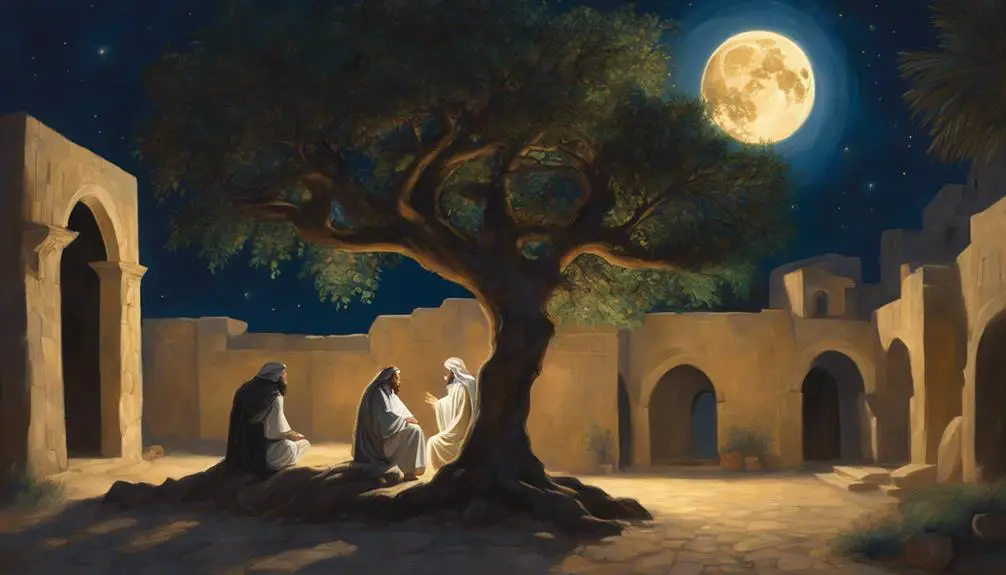
In the quiet shroud of night, Nicodemus, a Pharisee and member of the Jewish ruling council, seeks out Jesus for a private conversation, marking a significant nocturnal event in biblical narratives. This encounter, recorded in John 3:1-21, is imbued with night time symbolism, shedding light on Nicodemus' transformation and spiritual awakening.
Night, often associated with secrecy, uncertainty, and fear, provides a fitting backdrop for Nicodemus' initial spiritual ignorance and uncertainty. Yet, it's not just the cover for clandestine meetings but also a metaphor for spiritual darkness. Nicodemus, despite his religious stature, is depicted as wandering in this spiritual night, seeking clarity.
Jesus' teachings during this nocturnal encounter are enlightening, challenging Nicodemus' understanding of faith and salvation. His words, 'You must be born again' (John 3:7), trigger a transformative process in Nicodemus, ultimately leading to his public defense of Jesus in John 7:50-52, and later, his involvement in Jesus' burial in John 19:39-40.
Frequently Asked Questions
What Is the Significance of Night in Biblical Narratives Beyond These Five Instances?"
Beyond these five instances, night holds deep symbolism in biblical narratives. It's often seen as a time for divine encounters or revelations.
The darkness can symbolize trials or times of uncertainty, but it's also when God often reveals His plans or truths.
How Do These Night Scenes Relate to the Overall Themes of the Bible?"
In examining overarching biblical themes, you'll find that darkness symbolism and night time faith play significant roles. Darkness often represents sin, ignorance, or despair, while night time faith denotes trust in God despite these challenging circumstances.
These elements relate to themes of redemption, spiritual growth, and God's enduring love, showcasing the believer's journey from darkness into light, from doubt to faith.
What Are Some Other Notable Occurrences of Dreams or Visions in the Bible, Aside From Jacob's Dream and Paul's Vision?"
You're delving into dream interpretation and divine messages in the Bible.
Aside from Jacob's dream and Paul's vision, other significant instances include Joseph's dream foretelling his rise to power and Pharaoh's dreams which Joseph interpreted as seven years of plenty followed by seven years of famine.
Then there's Daniel, who not only had prophetic dreams but also interpreted King Nebuchadnezzar's troubling dreams.
These instances highlight the Bible's use of dreams as a means of divine communication.
How Did the Concept of 'Night' in Biblical Times Differ From Our Modern Understanding?"
In biblical times, 'night' had deep symbolism, contrasting our modern understanding. Unlike today's mere absence of sunlight, it represented mystery, chaos, and even danger.
Biblical cosmology often associates night with spiritual battles or divine revelations. So, you'd find night as a time of profound encounters with God or moments of significant changes.
It's a fascinating study of how our perceptions of time have shifted historically.
What Role Does the Setting of Night Play in the Depiction of Jesus's Prayers in Gethsemane and Nicodemus's Visit?"
In the Bible, the night setting during Jesus's prayers in Gethsemane symbolizes solitude and deep spiritual connection. It's a time of quiet communion and intense struggle, adding dramatic weight to Jesus's prayers.
Likewise, Nicodemus's transformation is depicted under the cover of darkness, signifying the uncertainty and fear he initially feels, before he steps into the light of understanding. The night setting enhances these pivotal moments, adding depth and resonance.
Conclusion
You've journeyed through the Bible's night scenes, from Jacob's dream at Bethel to Paul's vision on the Damascus road.
You've felt the tension on the Passover night in Egypt and witnessed Jesus' solitary prayer in Gethsemane.
You've even sat with Nicodemus under the cover of darkness.
Each scene offers profound insights, shedding light on God's character and humanity's interaction with the divine.
As you step back into the daylight, carry these illuminating lessons in your heart.

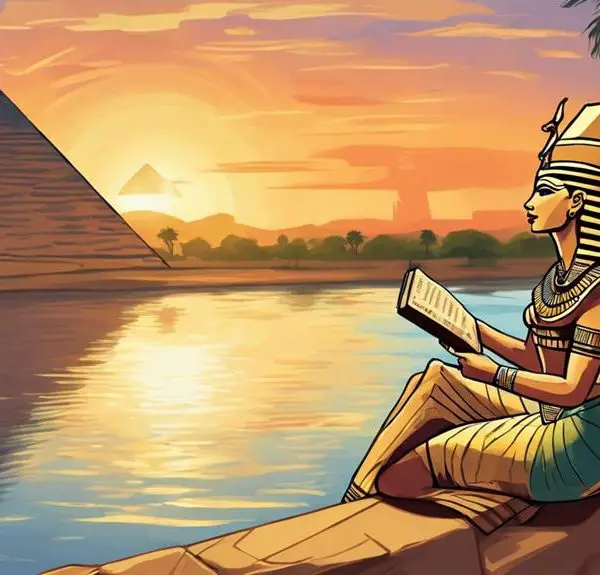
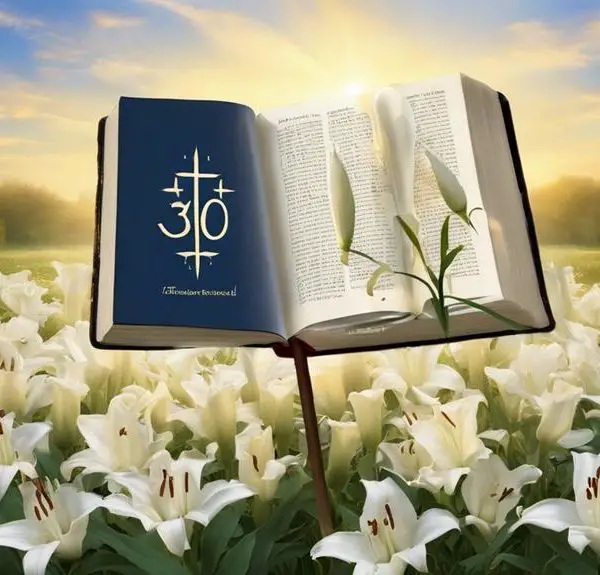
Sign up